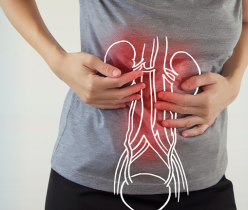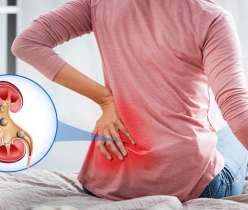The need to visit the toilet is a natural and important function of the human body, so excess waste products and toxins can be flushed out and eliminated as the body does not require them. This is the reason we need to urinate regularly. Holding urine for long periods can be harmful to your body, especially the kidneys, possibly leading to the formation of kidney stones. Read on to learn more about the signs of kidney stones, how they are caused, types, and treatments, including kidney stone surgery.
There are two kidneys located in the urinary tract, each attached to a urine tube that joins the kidney to the bladder and the urethra, which allows us to urinate. The kidneys perform various functions, including removing waste from the blood, balancing salts and other substances, and releasing hormones that build strong bones and form red blood cells. Here, it is important to note that your urine color indicates your hydration level and if you are consuming enough fluids. A pale yellow or clear color means you are adequately hydrated and that you have consumed enough liquid, which is quite enough to flush out the waste material and toxins from your body. Dark urine usually indicates that you are not getting enough fluids, leading to a buildup of chemicals and minerals that require fluids to break them up and pass through urination.
What causes kidney stones to form?
Kidney stones can occur anywhere in your urinary tract but most commonly form in your kidney, urethra, and bladder. The exact cause of kidney stone cause is still not understood, but it is believed that when your urine contains more crystal-forming substances, including oxalate, calcium, and uric acid, the fluid in your urine can dilute. Also, your urine may lack substances that prevent crystals from adhering together, forming a stable environment for kidney stones to form.
According to research studies, kidney stone is a common condition that affects more than half a million people in the US, affecting both men and women. Numerous factors could lead to the formation of kidney stones, but the major ones include lifestyle, diet, history of kidney problems (kidney damage symptoms, kidney failure), and dehydration. If you think you are overweight or obese, make sure you eat a diet that is full of sodium, uric acid, and purine, or if you have other medical conditions, you may be more likely to develop kidney stones. Other causes of kidney stones include:
-
- Dehydration
- Frequent urinary tract infections
- Blockage of the urinary tract, which does not allow the kidneys to expel
- Certain medications
- Having a sedentary lifestyle (lack of exercise or physical activity in your life)
- Family history of kidney stones
- Having other conditions or metabolic disorders. Kidney stones are one of the polycystic kidney disease symptoms.
Types of kidney stones
There are four types of kidney stones, namely:
-
- Calcium stones
- Struvite stones
- Uric acid stones
- Cysteine stones
Calcium oxalate stone is the most common type of kidney stone that people suffer from. Calcium is a part of an individual’s normal diet and an important element of diet that is crucial for the body; calcium not utilized by the bones and muscles directly reaches the kidneys and is normally flushed when an individual urinates.
Symptoms of kidney stones
What are the first signs of kidney stones? Well, the most observable kidney stone symptoms include:
-
- Severe stomach pain and lower back pain or groin pain
- Nausea, vomiting, fever, etc
- Not being able to urinate, blood in the urine, intense feeling of urge to urinate.
These signs of kidney disease may vary from one individual to another. These also resemble the early signs of other kidney diseases. Also, kidney disease symptoms in females are different from those in males. There may be an increased risk of reaching kidney failure sooner than women because of differences in hormone levels.
While kidney stones are treatable, you do not want to be a victim of this type of pain. For those with a history of kidney stones, there is a recurrence rate of 50 percent. If left untreated, chronic kidney disease symptoms may develop, or severe kidney damage occur. Kidney damage symptoms include muscle cramps, nausea, vomiting, itchy skin, dry skin, trouble sleeping, loss of appetite, swelling via feet and ankles, and urinating too much or too little.
In people with kidney disease symptoms, the kidney stone usually gets stuck in the ureter, the tube where urine passes from the kidney to the bladder. If the stone blocks the urine flow from coming out of the kidney, it gives rise to a condition called hydronephrosis, where the kidney swells up, often contributing to excruciating kidney stone pain. Kidney failure symptoms are also considered stage 3 kidney disease symptoms that require immediate medical attention.
How are kidney stones diagnosed and treated?
When a kidney stone tries to come out via the urinary passage, it is considered one of the most extraordinary, painful experiences. Therefore, when you sense something has gone wrong, fix an appointment with your healthcare specialist, as it can help lead you to a healthy life, relieve your pain, and avoid further complications. The diagnosis of kidney stones includes a physical examination, a urine analysis, and a series of other tests; your healthcare provider will help determine what actions to take. Kidney Diseases treatment depends on the size of the stone/stones, the severity of the disease, and any other condition (polycystic kidney disease, kidney infection symptoms, or kidney failure) or kidney infection is present. Healthcare professionals usually check if the kidney stone will pass normally before surgical intervention.
If the stone remains small, it may travel through the urinary tract and come out of the body naturally, or there is medicine to break up kidney stones. However, some stones grow too large that they can easily be passed out of the body and stuck in between, blocking the urinary passage.
Several procedures are also available to precisely and accurately for break up or kidney stone removal. If left untreated, these stones can cause blockage of normal urine flow, causing kidney infection and severe pain, and some people may also experience kidney failure symptoms.
To avoid the development of kidney stones and other severe health complications, do not hold your urine for longer periods, eat a healthy diet, preferably with low fat and low sodium, and drink plenty of water. Consult your doctor to learn more about kidney stones, chronic disease symptoms, and the best treatment that suits you.




